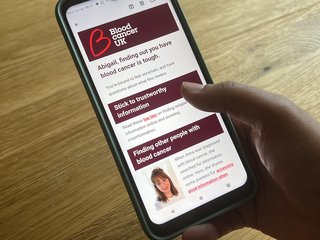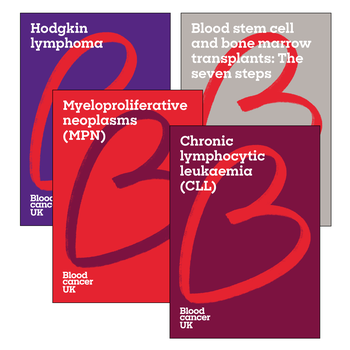Acute promyelocytic leukaemia (APL)
APL is a type of blood cancer that affects cells called promyelocytes, which are white blood cells at an early stage of development.

APL at a glance
Acute promyelocytic leukaemia (APL) happens when the promyelocytes (a type of blood cell) don’t fully develop and become cancerous.
APL is an 'acute' leukaemia, which means it develops quickly and needs treatment straight away.
APL is rare. Each year, around 160 people are diagnosed with it in the UK.
The condition is more common in adults than children and mostly affects people aged 30 and over.
Read more about APL.
Sign up to our weekly support email for people recently diagnosed.
It gives you clear and simple information, practical tips and advice from others with blood cancer, to help during the first few weeks and months after diagnosis.
If someone you love has been diagnosed with APL, you might find our information for family and friends helpful. It covers how to support someone with blood cancer, practical tips, coping with your own emotions, and real stories from other friends and family members.
You may also want to try our podcast for family and friends, Blood Cancer Heart to Heart, featuring honest conversations between people who know what it's like to have a loved one diagnosed with blood cancer.
We don’t know exactly what causes APL, but there are some things that may increase your risk, including age and previous treatment for cancer.
Learn more about the possible causes of APL.
People with APL may experience blood clots, extreme tiredness, weight loss, unexplained bruising or bleeding, and infections that last longer or happen more often than normal.
Find out more about the symptoms of APL.
If doctors think you might have APL, you'll have a series of tests. These tests will allow doctors to look at your blood, bone marrow and genes to help them diagnose you.
Learn more about tests to diagnose APL.
APL develops quickly, so fast diagnosis and treatment are really important.
If you're diagnosed with APL, you'll be treated with a combination of two drugs – either ‘all-trans retinoic acid’ (ATRA) and ‘arsenic trioxide’, or ATRA with chemotherapy. Some people may go on to have a stem cell transplant (also known as a bone marrow transplant).
Read more about treatment and side effects for APL.
Most people with APL respond well to treatment and have a good prognosis (outlook).
Your prognosis will depend on things like your general fitness, how high your white blood cell count was when you were diagnosed, and how successful your treatment is. Your healthcare team are the best people to ask about this.
Read our general information about things that might affect your prognosis for APL.
Clinical trials are how we find new treatments and improve current ones. We can help you find out about clinical trials for APL. Even if you just want to know a bit more about APL research, try our Clinical Trials Support Service.
Read about the impact our leukaemia research has had for people with a APL diagnosis.

Get a weekly support email from us
We'll send you clear and simple information, practical tips, and advice from other people with blood cancer, to help during the first few weeks and months after diagnosis.



